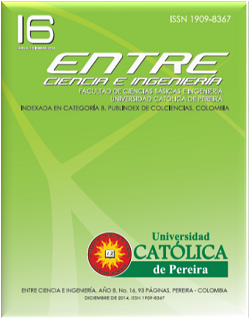Determination of thermodynamic parameters and design of a hydrogen fuel cell level pilot plant
Keywords:
Thermodynamic properties, fuel cell (electrochemical reactor, Nafion 117 (Nafion 117), potentiostatic, galvanostatic (galvanostatic)Abstract
The clean alternative energy production is a challenge facing society, therefore, through the analysis and design made a prototype production cell hydrogen proton-type pilot plant level (PEM), operating in potentiostatic conditions
1V, 1.23 V and 5 V and galvanostatic conditions of 30 mA, 40 mA, 50 mA, 70 mA, 80 mA y 90 mA for 10 minutes, using KOH as a catalyst and four steel electrodes preactivated with 3 mm separation between them (73 cm2 surface), It was permitted to obtain the thermodynamic parameters, such as the enthalpy of the reaction, the Gibbs free energy and entropy; besides it was stablished optimal potential experimental work and energy efficiency when a Nafion 117 membrane on (surface 36 cm2) was used and in the absence of the same.
References
Dodik Kurniawan, Hayato Arai, Shigeaki Morita, Kuniyuki Kitagawa. Chemical degradation of Nafion ionomer at a catalyst interface of polymer electrolyte fuel cell by hydrogen and oxygen feeding in the anode. Microchemical Journal, volume 106, pp. 384–388, 2013.
Hsieh-YuLi, Yun-YangLee, Juin-Yih L, Ying-Ling. Liu Composite membranes of Nafion and poly (styrenesulfonicacid)-graftedpoly (vinylidene fluoride) electrospun nanofiber mats for fuel cells. Journal of Membrane Science, volume 466, pp. 238–245, 2014.
Bingbing Wua, Ming Zhao, Weiyu Shi, Wenming Liu, Jianguo Liu, Danmin Xing, Yingfang Yao , Zhongjun Hou ,Pingwen Ming Jun Gu, Zhigang Zou The degradation study of Nafion/PTFE composite membrane in PEM fuel cell under accelerated stress tests. International journal o f hydrogen energy, volume 39, pp. 14381-14390, 2014.
Dodik Kurniawan, Shigeaki Morita, Kuniyuki Kitagawa. Durability of Nafion-hydrophilic silica hybrid membrane against trace radial species in polymer electrolyte fuel cells. Microchemical Journal, volume 108, pp. 60–63, 2013.
Ted H. Yu, Wei-Guang Liu, Yao Sha, Boris V .Merinov, Pezhman Shirvanian, William A. Goddard. The effectof different environment son Nafion degradation:Quantum mechanics study. Journal of Membrane Science, volume 437, pp. 276–285, 2013.
Rafael Nogueira Bonificacio, Almir Oliveira Neto, Marcelo Linardi Influence of the relative volumes between catalyst and Nafion ionomer in the catalyst layer efficiency. International journal o f hydrogen energy, volume 39, pp. 14680-14689, 2014.
Stefan Kreitmeier, Gabriel A. Schuler, Alexander Wokaun, Felix N. Büchi. Investigation of membrane degradation in polymer electrolyte fuel cells using local gas permeation analysis. Journal of Power Sources, volume 212, pp. 139-147, 2013.
Teuku Husaini, Majlan Edy Herianto, Yaakob Zahira, Wan Daud Wan Ramli. PTFE- Nafion membrane reactor for hydrogen production. International Journal o f hydrogen energy, volume 38, pp. 9553-9561, 2013.
Minoru Umeda, Kazuya Sayama, Takahiro Maruta and Mitsuhiro Inoue Proton activity of Nafion 117 membrane measured from potential difference of hydrogen electrodes. Ionics, volumen 19, pp. 623–627, 2013.
Bladimir Ramos-Alvarado, Joshua D. Sole, Abel Hernandez-Guerrero, Michael W. Ellis Experimental characterization of the water transport properties of PEM fuel cells diffusion media. Journal of Power Sources, volume 218, pp. 221-232, 2012.
N. Yousfi-Steiner, Ph. Moc¸ ote´guya, D. Candussoc, D. Hissel, A. Hernandezb, A. Aslanides A review on PEM voltage degradation associated with water management: Impacts, influent factors and characterization. Journal of Power Sources, volume 183, pp. 260–274, 2008.
Yueqi Luo, Kui Jiao Bin Jia. Elucidating the constant power, current and voltage cold start modes of proton exchange membrane fuel cell. International Journal of Heat and Mass Transfer, volume 77, pp. 489– 500, 2014.
Z, Omar, Sharaf, Mehmet F. Orhan. An overview of fuel cell technology: fundamentals and applications renewable and Sustainable. Energy Reviews, volume 32, pp. 810–853, 2014.
K. Polychronopoulou, C.M. Kalamaras, A.M. Efstathiou. (2011). Ceria-based materials for hydrogen production via hydrocarbon steam reforming and water–gas shift reactions, Recent Pat. Mater. Sci. 4 Volume 2, pp. 1–24, 2011.
Ramos Silvina, Gabriela. Electrodos de tecnología avanzada para sistemas de conversión de energía. Universidad Nacional de La Plata. La Plata. 2013.
C. Heitner-Wirguin. (1996). Recent advances in perfluorinated ionomer membranes: structure, properties and applications. J. Membr. Sci. volume 120, pp. 1-33, 1996.
K.D. Kreuer. On the development of proton conducting materials for technological applications. Solid State Ionics, volume 97, pp. 1-15, 1997.
Larminie, J., Dicks, A., Chichester, John. Wiley & Sons. Fuel cell systems explained. Second Edition. London, 2000.
Mayandía Aguirre, Antonio. Descripción y Modelado de una Pila de Combustible de Membrana de Intercambio Protónico. Universidad Carlos III de Madrid. Madrid. 2009.
Reyes H., Pérez Herranz. Aplicación de la Química Industrial en Reactores Electroquímicos de Compartimentos Separados. Entre Ciencia e Ingeniería, volumen 12, pp. 9 – 20, 2010.
Reyes Pineda, Henry. Estudio de la recuperación de cromo hexavalente mediante un reactor electroquímico de compartimentos separados por separadores cerámicos. Universidad Politécnica de Valencia. Tesis Doctoral 2007.
Larminie, J., Dicks, A., Chichester, John. Wiley & Sons. Fuel cell systems explained. Second Edition. London 2000.
Hinatsu JT, Mizuhata M, Takenaka H. Water uptake of perfluorosulfonic acid membranes from liquid water and water vapor. Journal of Electrochem Soc, volume 141, pp. 1493–1498, 1994.
Chen S-L, Xu K-Q, Dong P. Preparation of threedimensionally ordered inorganic/organic bi-continuous composite proton conducting membranes. Chem Materials, volume 17, pp. 5880–5883, 2005.
Acuña Garrido, Fráncico., Muñoz Yi, Ventura. Una alternativa amigable con el medio ambiente para la generación de potencia y su impacto con el desarrollo sostenible en Colombia en el siglo XXI. 2011.
K. Polychronopoulou, C.M. Kalamaras, A.M. Efstathiou. (2011). Ceria-based materials for hydrogen production via hydrocarbon steam reforming and water–gas shift reactions, Recent Pat. Mater. Sci. volume 4, pp. 1–24, 2011.
Umberto Lucia. Overview on fuel cells. Renewable and Sustainable Energy Reviews, volume 30, pp. 164–169, 2014.








 Revista Entre Ciencia e Ingeniería
Revista Entre Ciencia e Ingeniería .png) entrecei@ucp.edu.co
entrecei@ucp.edu.co.png) ISSN (Impreso) 1909-8367 - ISSN (En Línea) 2539-4169
ISSN (Impreso) 1909-8367 - ISSN (En Línea) 2539-4169 Attribution-NonCommercial 4.0 International (CC By-NC 4.0)
Attribution-NonCommercial 4.0 International (CC By-NC 4.0)
.png) Carrera 21 No. 49-95 Av. de las Américas, Pereira, Risaralda, Colombia
Carrera 21 No. 49-95 Av. de las Américas, Pereira, Risaralda, Colombia